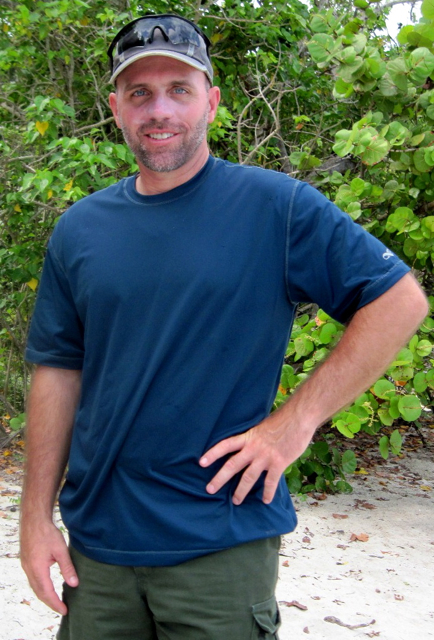
“That’s why rules are here,” he said, pulling from his wallet a card that explains the National Park Service’s mission of protecting the resources for generations to come.
Horner, like many other park rangers, started with seasonal jobs. The Ohio native worked winters at Big Cypress National Preserve in Florida, spending summers at such diverse places as Glen Canyon National Recreation Area in Arizona and Utah, Asateague Island National Seashore in Maryland and George Rogers Clark National Historical Park in Indiana. All the jobs were in interpretation, helping visitors to understand more about the parks.
Early on, he decided he wanted to see the world. After graduating from high school, he joined the U.S. Army. He spent stints in Germany and Iraq, where he served during the first Gulf War. He worked as a combat engineer whose job included blowing up bridges.
When he came home, he went off the Ohio’s Miami University, getting bachelor’s degrees in botany, zoology and anthropology.
After four years at the seasonal ranger jobs, the Peace Corps beckoned. He went to Guatemala, helping the mayor of a small town develop a national park. The issues were many, and Horner said the mayor’s cronies were fond of using the acreage as a hunting ground and for cutting wood. Nearby residents shot at “anything that moved” for food.
“How do you teach conservation …” he asked, referring to the social issues that surrounded setting up that park.
After the Peace Corps, he returned to the Park Service, but with more permanent jobs available in law enforcement and the acknowledgement that conservation includes protecting the resources, he switched gears.
He spent time at Cape Lookout National Seashore in North Carolina before arriving on St. John in fall 2006.
The job has challenges but he said he likes the enthusiasm and excitement he hears from visitors who have their first encounter with such park resources as turtles.
Especially during the summer months, he said he has to work hard to convince local residents about conservation. Commercial fishing is an issue. It’s not allowed in the park, but Horner said that fishing for personal use is permitted.
He and his fellow enforcement rangers keep a log of boats that cause problems, he said.
“But every day at the beach, someone has a dog, someone has a glass bottle and someone is anchoring in the dinghy channel,” he said, speaking about prohibited activities.
Drunks are also a problem, and he said it’s hard to talk to people who are intoxicated.
He also deals with parking issues. Parking lots at the popular Trunk Bay as well as other beaches are often filled, forcing people to park along the roads. While he’ll issue tickets and make arrests if it’s necessary, Horner said he’d much rather make encounters with visitors and residents educational in nature. Since those tickets and arrests involve paperwork, and in the case of arrests, a trip to U.S. District Court on St. Thomas, Horner would prefer to spend his time protecting the park’s resources.
He’s soon off for a week to Mexico’s Baja California to a UNESCO World Heritage site, Bahia de los Angeles on the Sea of Cortez. He’s one of 350 people from the United States and abroad who will study and put into place conservation practices under the auspices of Miami University and the Cincinnati Zoo.
“Dave through this summer educational opportunity is returning to his first love, helping folks less fortunate than himself. A genuine hero.” Park Superintendent Mark Hardgrove said.
As for the future, he just doesn’t know. He’d like to continue in conservation, working in place with beautiful natural resources, but pointed out that many such jobs don’t pay. And he’d also like to get married and have a family.
“But it’s hard to find a wife who loves to travel,” he said.





